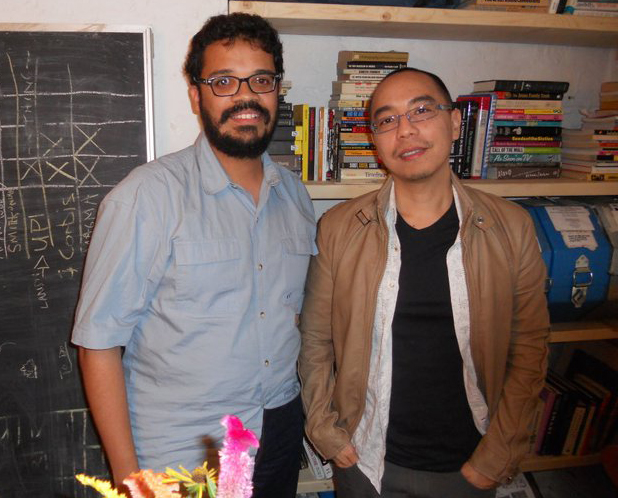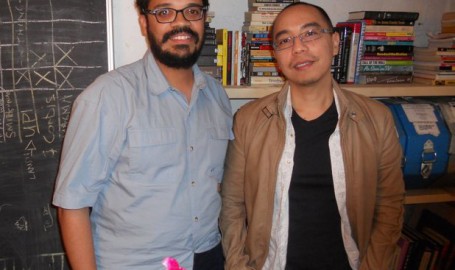
The first characters we see in your new film establish the theme of the gaze…
Also operates the same way as Tropical Malady, my 2004 movie. The character look to the audience, in a way, to let them know this is a film. You’re looking at illusion, it’s the start of the film, yeah…
So it’s essential for you to establish a difference between reality and images on film…
Yes. The goal is to create awareness of being in a theater with this kind of collective experience. People watching these flat images… I don’t know, it just feel… I want to break the reality and to say that there’s no such thing as truth in cinema, it’s always about subjective point of view. Even though the story is classical, the way of making it doesn’t have to be.
We experience reality through our perception of images, why is film different?
Because we go to the cinema to dream. That operates in a scientific way, but for me it’s a magical way. When we sleep we dream to maybe readjust our brain, our mind. The same way we go to cinema. We enter a certain state of being hypnotized, that’s why I think the theater is very important.
One of the main subjects is also spirituality, the way it transcends from our normal life experiences. Is that transcendence the same you’re looking for in film?
Yeah, it’s something I don’t understand also about movies, about how it works. Each film is different; it’s magic, a black magic that you don’t know how it works. How through time it shapes the experience, and how sometimes watching a second time changes the experience. The setting, the way you watch the movie, affects also the experience. This medium is a mysterious one for me; I still don’t know how to crack the code, I don’t have the answer of what his nature is.
You have experience in a lot of other mediums. How different is to work on film than any of the others?
For film it takes quite a while to get used to it and I’m still not used to it. Comparing it to animal, each work is a different animal. It’s like when you raise one, you have to tame it, and you have to get to know it. And for me film it’s a very fierce and angry animal. Still through the post-production process it’s still growing, still mutating. For other mediums the process is more logical, like when you make moving images for gallery, with visual arts, it becomes more interactive with the audience, their distance; the audience becomes more active walking into a space to interact. Other mediums have to do with the audience also, but for cinema it’s mostly the director who has to work very hard on the screen, to hypnotize you.
There are multiple gazes on the film and they involve other mediums. Like in the scene where a monk watches himself on television watching himself…
And because it’s on film it’s like we’re watching him watching himself. So that’s another thing, that’s more about us and less about the guy. It’s also, again, awareness that we also watch this illusion. For me film is different than watching television, because TV it’s so fresh and intermediate, something you can discard away. But film it’s a tool to create awareness and also to imprint and to express memory.
It’s that why you contextualize the world in the film through photographs and TV. Why you choose those mediums to show the mundane?
I want to talk about time and how we experience movies through time. Sometimes we move from point A to B and suddenly the image stops to move, so it’s like going back to the days before cinema, when images haven’t learn how to move yet, so it becomes a series of stills. Also because in the movie there’s a reference to an old kind of cinema. So I’m addressing the history of memory and of my own memories of those old kinds of film. The still images are in memory of people like Chris Marker, Antonioni, but in that sequence I’m talking about the future using a technique of films from the sixties, from the seventies. So at the same time I’m talking about the past, the present, the future. Setting that up within the village establishes a dialogue, so it’s like a ping pong going back and forth…
The role of memory is in the center of the film, but there’s no clear path of whose memories. If they’re coming from the central character, if they are stories within the film…
The title says this movie is about reincarnation, about multiple lives and memory; in fact, if it wasn’t for this title you probably wouldn’t know what’s going on (laughs). They’re just chapters of life and with the richness of its own sounds. It’s about… life. At one point I think I want to leave room to be open, a very big room for the audience to interpret or to experience the movie in their own way. So for me it’s quite limiting, it’s quite difficult to put my own references, to tell my own references to the audience: ‘this mean this, I’m referring to this or that…’ I think that putting a frame of thinking to the audience before they see the move it’s quite harmful, it’s dangerous, so I try to explain just the surface…
In your previous films you also tackle the subject of families. Maybe this approach is more poetic and less realistic, more involved with the spiritual world?
I want to express this idea of co-existence between the spiritual world and the physical one of us humans. There’s common believe in Thailand that we have spirit in objects. In a living object like a tree, each tree has a different spirit in it with different names (laughs). I grew up with this, I can’t say I believe but it’s something I can’t shake off; this idea that there’s something around us. This co-existence also manifests in fables, comic books in the past, old film. Sometimes the dead come back, like when the wife comes back to live with the husband, she cooks for him, they even make love. So the line between life and dead is almost non-existent. This kind of thing it’s disappearing, so when the film is presented this way it can become melancholic and at the same time becomes funny because you don’t see it in contemporary movies. And that’s the thing when you approach this movie, you don’t know whether to laugh, or to feel sad. I think this kind of idea is present throughout the movie.
Also the transgression on your film it’s very different from the usual way in recent films, it’s not a violent transgression.
You can make classical stories with different styles and in film there’s lots of room to do that. Film it’s just over a hundred years old and there’s a lot of room to play. Even within traditional stories there are unlimited ways to tell it.
In your filmmaking you try to stick to your own style or to a style maybe dictated by the story you want to tell?
For this film it’s a mixture of both, because each story is a tribute to a different style of film. For example, for the dinner scene I had a different shooting style, using more close ups, more reaction shots. It’s a concept of paying tribute to old television drama, when it was shot on Super 16, in a studio, with certain kind of lightning. So it’s not my style, it’s a concept.
What makes Toronto special?
I was here last night to present the film and it was really late, the screening finished at midnight and I was really happy to see the audience still staying and to listen to Q&A. I think the reaction was quite good, there were many interesting questions. I think it’s a festival with an audience very curious about all kinds of movies. I wish it happened in Thailand.
What would be the role of film in terms of its social impact?
I would say it could also be a propaganda tool and still a very powerful one. It shapes the trends. In Thailand moving images have been used in religion, by the government, all of them. Always moving images…
